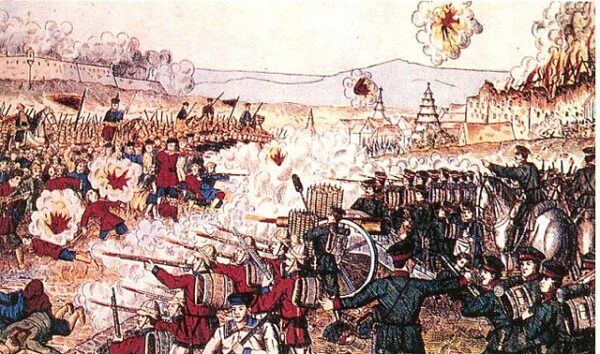The Declaration of Independence, adopted on July 4, 1776, was a seminal document that not only marked the birth of the United States but also launched a transformative era: the modern world that lifted billions alive and yet unborn. Its impact reverberated across continents,…
Read MoreThe Night of the Long Knives, known in German as “Nacht der langen Messer,” was a pivotal event in the history of Nazi Germany, occurring from June 30 to July 2, 1934. It marked a critical turning point in Adolf Hitler’s consolidation of power,…
Read MoreThe Globe Theatre, an iconic symbol of the English Renaissance and intimately associated with William Shakespeare, experienced a devastating fire on June 29, 1613. This fire not only obliterated a physical landmark of Elizabethan theater but also marked a significant moment in the history…
Read MoreHungry sailors are not to be trifled with. That’s what happened aboard the Russian battleship the Potemkin on June 27, 1905. Spoiled meat sparked a storm of rebellion that echoed across revolutionary-minded Russia. The US Naval Institute helps contextualize things: “For a century before 1905, Imperial Russia was…
Read MoreOn June 26, 1945, the world came together to create the United Nations, marking a pivotal moment in international diplomacy. In the auditorium of the Herbst Theater in San Francisco, delegates from 50 nations gathered together in hopes of creating an organization that would…
Read MoreOn June 25, 1950, North Korean forces crossed the 38th parallel in a coordinated and well-planned assault, sparking the Korean War. The invasion was a surprise, catching South Korean and American forces off guard. Within hours, the North Korean People’s Army (KPA) overwhelmed South…
Read MoreOn June 24, 1497, John Cabot, an Italian navigator commissioned by King Henry VII of England, became the first European to lead an expedition to North America since the Norse explorations of Vinland. His historic landing stood as a pivotal moment in the era…
Read MoreOperation Barbarossa, the codename for Nazi Germany’s invasion of the Soviet Union during World War II, began on June 22, 1941. This operation marked a pivotal moment in the war, characterized by its scale, ambition, and the profound consequences for the rest of the…
Read MoreOn June 22, 1990, one of the most famous checkpoints in the world came down, opening a new path for unity and peace in Germany and showing a new era of world history was right around the corner. A major crossing through the Berlin…
Read MoreThe Boxer Rebellion, also known as the Yihetuan Movement, was an anti-foreign, anti-colonial uprising in China between 1899 and 1901. This tumultuous period was marked by intense anti-imperialist sentiments among the Chinese population, which culminated in violent clashes and significant international intervention. The rebellion…
Read More










